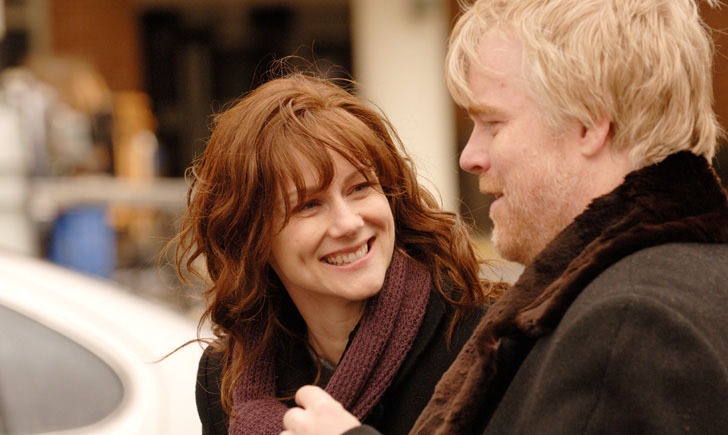
For the Love of Indies
Written by Jenny Halper | Posted by: Anonymous
One of New England’s own, Linney attended boarding school in Massachusetts, studied theater at Brown, and currently lives in Connecticut. Today she’s in Boston to promote Tamara Jenkins’ The Savages, her fifth movie released in 2007 following performances as an icy FBI agent (Breach), a morally comprised wife (Jindabyne), an overbearing mom (The Hottest State), and a Manhattan socialite (The Nanny Diaries). On screen she’s a chameleon; in person the actress is disarmingly down-to-earth and smart enough to intimidate you even though that’s clearly not what she’s trying to do. In her latest movie she plays Wendy Savage, a late-thirties aspiring playwright whose neuroses implode when her dad (Philip Bosco) is checked into a nursing home and she moves to her brother’s (Philip Seymour-Hoffman) house in the cold doldrums of Buffalo.
“She’s a little manic and a little spastic,” Linney laughs, flopping down on said large couch and looking especially relaxed for someone who has spent the day talking to a rotating carousel of journalists (and giving them an extra five minutes of face time, which for movie stars is pretty rare). “What I loved about her is the boundaries of her character are very wide apart. She can be a narcissist beyond narcissistic and she can be very empathetic. She can be childlike and then she can really step up to the plate and do the right thing. It gave me a lot of room in between, and the trick was not the extremes of her character but all the stuff in between.”
You could say that Linney, who has remained attached to several notable independent films through years of hellish pre-production, has made a career out of navigating the grey area between small, character-based movies and glossier mainstream fare that’s worthwhile even when it doesn’t completely work (see Diaries for her brittle, complex performance — and for Paul Giammatti’s turn as her jerk-of-a-husband). Since Kenneth Lonergan’s You Can Count On Me garnered her an Oscar nomination six years ago, she’s picked international projects with gold all over them, despite the fact that not all end up in theaters nationwide.
Take, for example, Jindabyne, an excellent Raymond Carver adaptation that Lantana director Ray Lawrence shot with natural light. Or screenwriter Jeremy Brock’s directorial debut, Driving Lessons, in which she donned a British accent and religious fanaticism. Or Kinsey, in which she aged four decades (no vanity here) and was nominated for yet another Oscar. She was the first person cast in that film, and spent four years cheerleading writer/director Bill Condon (Gods and Monsters) as he tried to raise the money needed for production (many of the independent films she appears in are independently produced and later distributed by specialty branches of bigger studios, such as Sony Pictures Classics and Fox Searchlight).
“No one wanted to do it,” she says of Kinsey. “I knew how wonderful it was, and I had no doubt in my mind that was going to get made, I just knew that it would take a while. You sort of learn, over time, that [films] get made when they’re meant to get made. You go through devastating moments of losing actors, and most of the time? The right actor shows up.”
Such was the case with Noah Baumbach’s The Squid and the Whale, which was made, on a very tight budget, in under a month. Linney was also the first actor attached to Squid — she was given the script four years (magic number?) before Baumbach began shooting on location in Brooklyn.
“I remember calling Noah all the time, being like ‘hang in, hang in, I promise you, it will get made,’” she says. “We lost one actor, lost another actor, got one actor who wanted to change everything.” At this she shakes her head, stressing: “Story first. Story first.” As the daughter of playwright Romulus Linney, she has been around scripts and immersed in the New York theater scene since childhood.
The Savages, which premiered at the 2007 Sundance Film Festival and is being distributed by Fox Searchlight, deals with the potentially gnarly subject of nursing homes in a quirkily unsentimental way: writer/director Tamara Jenkins was inspired by authentic details culled from daily dog walks past one such facility. “The script was in perfect condition to start,” Linney says. “You know you’re in ahead of the game when you have that. I’ve only worked on a few movies that are ready to go. The really well written scripts, it’s impossible not to start working on them, even before you have the job.”
But like Squid and Kinsey, Savages, which is Jenkins’ follow-up to her cult classic debut, Slums of Beverly Hills, was a movie many financiers didn’t want to touch.
“People read a script and they don’t see what’s there,” Linney says. “They don’t understand how dimensional it is. They don’t see the humor. Most investors — God bless them, we couldn’t do anything without them — but they’re not trained to look at a script the way that actors are. Sometimes scripts get caught in that situation, and there are a lot of times when investors or executives don’t understand that a script has to be changed to be executed. But what has happened recently — and this is just the reality of the business — is that a lot of scripts are not written to be acted, they’re written to be green lit or they’re written to be financed.”
Even independent films?
“Umm-hmm,” Linney nods. “The agenda behind the writing is very different. They’re trying to convince someone to give them the money, and a lot of scripts that are fueled by that desperation are not actable. They might [work for] an investor who doesn’t know how to read a script, just like I don’t know how to read a blueprint for a house: I wouldn’t understand the scale, I wouldn’t understand the depth. I wouldn’t be able to get around that.”
Maybe not, but she does have the intuition to find and remain faithful to material many in the film industry only laud after the fact. As the interview draws to a close, the publicist re-enters and Linney holds up a hand, giving us a little more time and explaining that, though her success has supported independent films, she is “not that powerful.”
"I would love to think I’ve helped other people get films made," she says. "The reality is, financially I certainly haven’t. I think in a support way, hopefully, I have." Then she thanks us for coming and we duck out of the room, past another other group of journalists waiting in the hall.
Related Image: Linney and Philip Bosco.
Visit The Savages’ official website.









